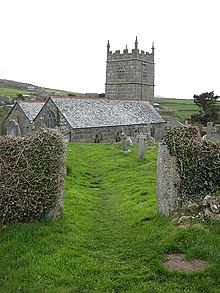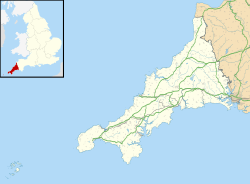St Senara's Church, in Zennor Churchtown, Cornwall, England, UK, is the parish church of the parish of Zennor.[1] It is in the Deanery of Penwith, Archdeaconry of Cornwall, and Diocese of Truro.[1] It is dedicated to the local saint, Saint Senara, and is at least 1400 years old, though it was rebuilt in the 12th century. It is a Grade I listed building.[2]
| Church of Saint Senara | |
|---|---|
 St Senara's Church in Zennor | |
| 50°11′30″N 5°34′03″W / 50.1918°N 5.5674°W | |
| Denomination | Church of England |
| History | |
| Dedication | Saint Senara |
| Administration | |
| Province | Canterbury |
| Diocese | Truro |
| Archdeaconry | Cornwall |
| Deanery | Penwith |
| Parish | Zennor |
| Clergy | |
| Priest(s) | Revd. Elizabeth Foot |
Listed Building – Grade I | |
| Official name | Church of Saint Sennar |
| Designated | 10 June 1954 |
| Reference no. | 1312091 |
History
editA church dedicated to Saint Senara has stood on the current site overlooking the sea since at least the 6th century AD, but the current building is partly Norman and partly of the 13th and 15th centuries (the north aisle 15th century). There is a west tower and the octagonal font may be from the 13th century. It was reputedly founded by Saint Senara on her return from Ireland with her son, who was by then a bishop, when they founded the village of Zennor.
One of only two remaining bench-ends in the church portrays the Mermaid of Zennor, depicted admiring herself in a mirror. This is on the so-called "Mermaid Chair" which also has carvings of fish on the seat, and which is believed to be at least 600 years old.[3][4]
On the church's outside wall, next to the west porch, is a memorial to John Davy, 1891, the last person to speak Cornish fluently.[1] The church is surrounded by a small circular graveyard, the boundaries of which have existed since the Bronze Age and in which parishioners have been buried for centuries. The churchyard holds the graves of the artists Bryan Wynter and Patrick Heron, who both lived in Zennor and drew inspiration from the surrounding landscape for their art.[citation needed]
Both this church and the church of the nearby village of Morvah lay claim to the local legend of a cow eating the bell-rope, at a time when such items were fashioned from straw.[5]
The tower contains six bells in the key of G, four of which were cast by Gillett & Johnston in 1926 to accompany the two medieval bells already there. They are currently unringable due to corrosion of the bell-frame. In 2019, a full restoration of the bells was started by John Taylor & Co, which will once again allow them to be used for change-ringing.[6][7]
Today
editSaint Senara's is the parish church for Zennor, and mainly serves the village of Zennor, more properly called "Zennor Churchtown", after the church, to distinguish it from Zennor parish. The church remains in regular use for Sunday services, as well as hosting special events such as weddings and funerals.[1] The priest-in-charge is Revd. Elizabeth Foot.[8]
Gallery
edit-
Mermaid chair and altar
-
Mermaid chair
-
Interior
-
Baptismal font
-
Zennor churchyard
-
Stained-glass window depicting Saint Senara and Saint Ia
References
edit- ^ a b c d St Senara, Zennor at A Church near you, from the C of E, retrieved 14/03/2012
- ^ Historic England. "Church of Saint Sennar (Grade I) (1312091)". National Heritage List for England. Retrieved 13 October 2015.
- ^ "St Senara's Church, Zennor, Cornwall". Haunted Britain. Retrieved 13 April 2012.
- ^ Viccars, Sue (22 June 2010). Frommer's Cornwall Day By Day. John Wiley & Sons. p. 134. ISBN 978-0-470-72100-1. Retrieved 13 April 2012.
- ^ Gibbons, Gavin (1970) Cornwall and the Isles of Scilly, A Geographica Guide, ISBN 009205370X
- ^ "Dove Details". dove.cccbr.org.uk. Retrieved 3 June 2019.
- ^ "Zennor, Cornwall". John Taylor & Co. Retrieved 3 June 2019.
- ^ "Home". zennorchurch.com.
- Mattingly, Joanna. (2016) St. Senara’s Church, Zennor: A Church History and Guide
External links
edit- Diary of James Stevens of Zennor & Sancreed (about the restoration of the church; additional information from: Mattingly, Joanna. (2016) St. Senara’s Church, Zennor: A Church History and Guide.)
